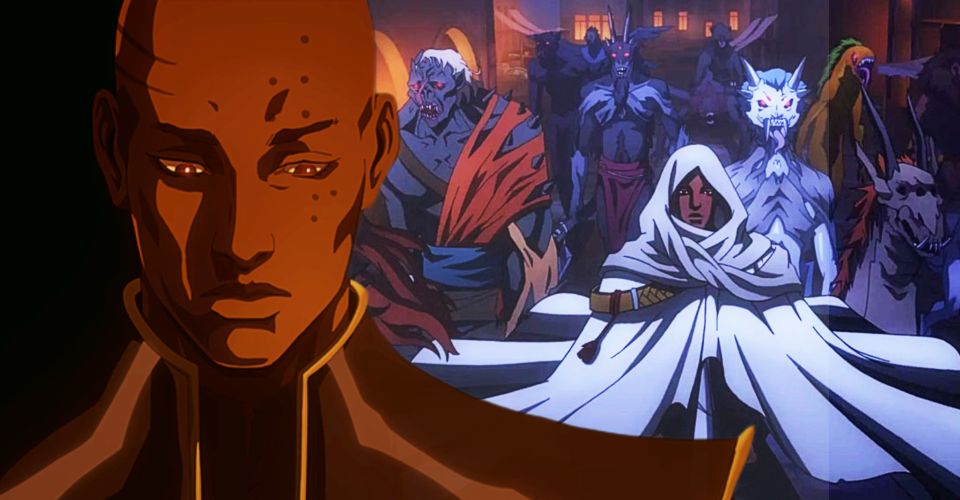Why Isaac Is Castlevania’s Most Interesting Character

While Netflix’s Castlevania has had its fair share of antiheroes, including the dangerous overreacher Carmilla and the ominous figure of Death itself, it is Isaac who undergoes the most interesting character arc throughout the show’s four seasons. Season 4 of Castlevania ended the grand saga with a flourish, granting beloved characters like Alucard, Sypha, and Belmont narrative resolutions they wholeheartedly deserved. However, despite setting up the stage for a grand transformation, which plays out on-screen to a certain extent, Isaac’s fate is bafflingly left unresolved in the season finale, titled “It’s Been a Strange Ride,” leaving a lingering element of dissatisfaction.
Season 2 of Castlevania first introduced Isaac, voiced by Adetokumboh M’Cormak, as one of the two human advisers in Dracula’s court. He acts as a forgemaster for the creation of Night Creatures. Being a queer person of color with a traumatic past, Isaac grew to abhor humanity, especially the inherent cruelty embedded within the race as a whole. Loyal to a fault, Isaac was the only person in Dracula’s court who didn’t betray him – an irony that was not lost on Dracula, who chose to save his life by flinging him through a teleportation mirror. What ensues is a deep journey into the self, wherein Isaac is forced to scrutinize the beliefs that shaped him, and embark upon a redemptive arc of sorts, whilst etching a story of his own making.
After Dracula’s death in season 2 of Castlevania and his unfinished act of wiping humanity off the face of Earth, Isaac encountered multiple humans who wished to inflict their cruelty upon him. Killing everyone who dared to bind, control, or threaten him, Isaac creates an army of Night Creatures with an allegiance only to him. However, his hawk-eyed hatred for humanity wavers when met with fleeting instances of human kindness, forcing him to re-evaluate his stance about the human race. While Isaac is reminded time and again that the human race is capable of committing atrocious crimes against its own kind, with acts of egregious betrayal, he is also gently reminded of the existence of human kindness. This not only prompts him to reassess his role as a forgemaster but also to realize that all throughout his life, he had lacked true agency. Instead of reacting to external elements, Isaac, for the first time in his life, chooses to act.

In the long history of the Castlevania world, Isaac is perhaps the character who changes the most. He undergoes an intrinsic change in his outlook when he chooses to bury the dead humans who were under the influence of The Magician and rebuild the city so that posterity will have a chance to inhabit it and flourish in it. In Season 4 episode 3 “Walk Away,” FlysEyes, the only Night Creature with the ability of speech and thought, questions Isaac about this root-level change in his nature. Using a berry as a metaphor, Isaac explains how a hammer can build and destroy at the same time, and that inherent natures and ambitions can always undergo a change. After years of raw aching and loneliness, Isaac finally has a purpose that is not dictated by those around him. He is no longer the knife that follows every command, but the hand that wields it.
In Castlevania Season 4 episode 6 “You Don’t Deserve My Blood,” Isaac succeeds at infiltrating Carmilla’s fortress and eventually engages in a visually breathtaking fight with the Styrian ruler, who seems to have been driven to the edge of sanity. While Isaac ensures Carmilla’s death and claims Styria as his own, he chooses not to act on his original plan of killing Hector for his betrayal and extends a hand of friendship to him instead. “Revenge is for children. We should both grow up,” he tells Hector, while convincing him that Dracula should not be re-awoken, since the broken, battered man deserves his rest. This simple act of mercy speaks volumes in terms of Isaac’s growth as a character, who now is able to interpret the world and its many facets with a nuanced eye. While the Castlevania season finale references Isaac as “king” in one of the scenes with Hector and Lenore (played by Downton Abbey’s Jessica Brown Findlay), there is no satisfactory resolution to the arc of one of the show’s most complex and fascinating characters.
About The Author


















